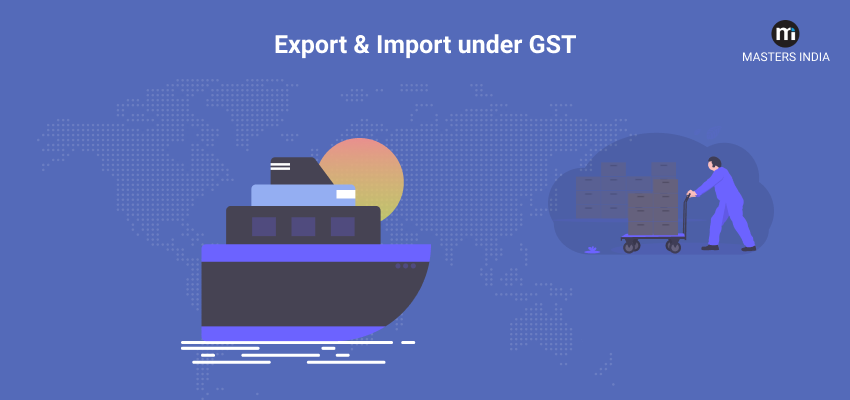Export and Import of Services under GST
India’s services sector has come a long way since the balance-of-payments crisis of 1990. Growing significantly due to the consequent relaxation of regulations, its significance in the Indian Economy has been steady. As per the Ministry of Statistics, the service sector accounted for more than 54% of the economy's Gross Value Added (GVA) in FY 2021-22 and attracted nearly 4/5 of total Foreign Direct Investment (FDI) inflows into India.
Since the BPO boom, international trade has been at the forefront of the service sector. India is the fastest growing nation in global services trade due to its distinct competencies and competitive advantage formed by knowledge-based services. While imposing taxes on foreign trade is a sure way to reduce the current account deficit, it reduces the volume of trade. Various legal provisions and government policies keep an eye on India's overseas service trade.
It is to be kept in mind that while taxation of export and import of goods are governed under the Customs Act, export and import of services are taxed under the Integrated Goods and Services Tax Act, 2017. This article goes over these provisions in depth.
What are services?
As per Sec 2(102) of CGST Act, services means anything other than goods, money and securities but includes activities relating to the use of money or its conversion by cash or by any other mode, from one form currency or denomination to another form, currency or denomination for which a separate consideration is charged.
Export of services
What do you mean by export of services?
Section 2(6) of IGST Act defines Export of Services as supply of any service when:
NB: Circular No. 161/17/2021, read with explanations 1 and 2 of Section 8 of the IGST Act clarifies on trade between establishments of a distinct person. As per this circular:
- Supply of services by an establishment of a foreign company in India to any other establishment of the said foreign company outside India will not be covered under definition of export of services.
- Further,
- Any branch, agency or representational office of a foreign company, located and operating in India; and
- Any branch, agency or representational office of an Indian company, located and operating outside India;
shall be treated as the establishment of such company in the country in which such branch is located. Therefore, any supply of services between such headquarters and branches shall not be treated as exports under GST.
- However, an Indian company, being the group concern of any foreign company, shall be considered as a separate legal entity from its foreign relative. Thus, supply of services between the two shall be treated as export, subject to the satisfaction of the other conditions laid down in Section 2(6).
Tax Treatment of Export of Services
GST treats exports as either of:
Zero rated supplies are not supplies having 0% tax rate; instead, it is an exempted supply–Input Tax Credit (ITC) would be available on such supply. This results in negative GST or a GST refund.
How to claim refund on export of services?
Under the old regime, duty drawback was provided for the tax paid on inputs for the export of exempted goods; this was a cumbersome process. However, under GST, a registered exporter (an unregistered person cannot make Zero Rated Supplies) has two options to claim a refund in compliance with GST guidelines.
Option 1 – Export of Services after payment of IGST without any Bond or Letter of Undertaking (LUT)
Under this option, the exporter can obtain refund of either IGST paid on export of services or unutilised input tax credit. In either case, refund can be claimed within 2 years from the relevant date.
- In case of the former, the exporter can claim for refund by filing form RFD-1 on the GST Portal. Also, a valid GSTR-3B is to be filed with the payment of applicable self-assessment tax Refund will be initiated upon filling of table 6A of GSTR-1 and shall be credited after verification by officer.
- On the other hand, Input Tax credit which could not be availed can be claimed by filing form RFD-01 on the GST portal.
Option 2 – Export of Services without payment of IGST under a Bond or Letter of Undertaking (LUT)
Meaning: A registered supplier also has an option to export services under Bond or Letter of Undertaking (LUT) and can claim a refund of unutilized Input Tax Credit. Via a Bond/LUT, a taxpayer promises to pay taxes along with interest, if services are not rendered within 1 year of issuing the export invoice. Refund for unutilized Input Tax Credit can be claimed by filing the form RFD-01.
Eligibility and validity: Any person who is prosecuted for cases involving an amount exceeding INR.
- Crore as well as, in cases where taxpayer does not comply with the conditions specified in LUTs within the required time are required to submit bonds. The validity of LUT is 1 year. A fresh LUT needs to be furnished every financial year.
Process: A registered supplier can submit a Bond or LUT in a specified format in Form RFD-11 prior to the exports on the letterhead of such supplier to the jurisdictional commissioner. Acknowledgement Reference number (ARN) is received once LUT is accepted.
Deemed Exports: Supply of services to an Export-oriented undertaking (EOU), Hardware Technology Park unit, Software Technology Park unit or Biotechnology Park unit shall also be treated as exports under GST.
Import of services
What do you mean by import of services?
Section 2(11) of the IGST Act defines import of services as the supply of any service, where:
- the supplier is located outside India.
- the recipient is located in India; and
- the place of supply of service is in India.
Section 7(4) of the IGST Act states that supply of services imported into the India shall be treated as inter-state supply of services. Further, as per Section 21 of said Act, all import of services shall be liable to IGST w.e.f. 1st July, 2017. The importer can, in turn, claim ITC on such GST paid. Various provisions of the IGST Act, along with Section 7 of the CGST Act deals with the taxation of import of services.
Consideration, business test and imports from related persons
As per the provisions contained in Section 7(1)(b) of the CGST Act, import of services for a consideration whether or not in the course or furtherance of business shall be considered as a supply. Thus, in general, import of services without consideration shall not be considered as supply.
Further, in view of the provisions contained in Schedule I of the CGST Act, the import of services by a taxable person from a related person or from a distinct person as defined in Section 25 of the CGST Act, in the course or furtherance of business shall be treated as supply even if it is made without any consideration. Thus, in this case, Business test is required but consideration test is not required to be fulfilled for import of service to be considered as supply.
Who should pay tax on services imported?
Section 5(1) of the IGST Act states that IGST shall be levied on all inter-state supply of goods or services or both (which includes import of services). Further, section 5(3) empowers the government to notify the cases where GST shall be paid on reverse charge basis. The following points cover some of the cases where the person responsible for payment of GST has been specified by the law.
Freight on imports: In case of services supplied by a person located outside India by way of transportation of goods by a vessel from a place outside India up to the custom station of clearance in India (i.e., on freight charged by foreign shipping lines), IGST is to be paid by the importer located in India. However, this will apply only if the importer is the recipient of such transportation services.
i.e., the shipping contract is to be entered into with the importer and not the foreign exporter.
Services provided by OIDAR: Online Information Database Access and Retrieval services (OIDAR) are a type of service that is sent via the internet and received by the recipient without any physical interaction with the provider. Examples of OIDAR include stock photographs available for automatic download, and online courses consisting of pre-recorded videos and downloadable PDFs. Section 14 of the IGST Act lays down specific provisions for supply of OIDAR services.
According to this section, in the case where such supply is provided to an unregistered recipient in India for non-business purposes, a Government, Governmental authority, or Local authority i.e. a Non-taxable online recipient (NTOR), the supplier who is outside India is liable to pay IGST on the supply on forward charge basis. Further, if the supply of such services is facilitated by an
intermediary located abroad, such intermediary is required to get itself registered and pay IGST on the supply.
In case of OIDAR services provided to a business entity (not being an NTOR) from a place outside taxable territory, the place of supply would be in India and the transaction would be amenable to tax under reverse charge i.e. the recipient located in India is liable to pay GST.
Services provided through an E-Commerce Operator (ECO): As per section 5(5) of the IGST Act, an ECO is required to pay IGST on notified services if these are supplied through its portal.
In the case services are obtained from an ECO which does not have a physical presence in India, but there is a person in India representing it for any purpose, such Indian representative is liable to pay IGST. If such an ECO neither has any physical presence, nor does it have a representative in India, it is required to appoint a person in India for the purpose of paying tax on such notified services.
Exemptions related to import of services.
Section 6 of the IGST Act empowers the Government to grant notified goods and services exemption from tax. Accordingly, Notification No.9/2017, inter alia, exempt the following from GST:
- Import of services by United Nations or a specified international organization for official use of the United Nations or such organization.
- Import of services by foreign diplomatic mission or consular post in India, or diplomatic agents or career consular officers posted therein, subject to conditions.
- Import of services in relation to temporary transfer or permitting the use or enjoyment of any intellectual property right, to the extent of aggregate of the duties of customs leviable under section 3(7) of the Customs Tariff Act, 1975, on the consideration pertaining to royalties and license fees, as included in the transaction value.
Registration of recipient of imported services
Section 24(iii) of the CGST Act requires compulsory registration for individuals who are obligated to pay tax through reverse charge and do not qualify for the registration threshold limit. As a result, importers, being recipient of services who is liable to pay IGST under reverse charge must get mandatory registration under GST legislation in order to pay tax on such services.
Conclusion
GST has a profound impact on both import and export of services in India. While an exporter of services can obtain a refund of the taxes paid by them, an importer will have to bear the brunt of GST, either directly or indirectly. These measures put forward by the IGST Act seek to promote export of services, while levelling the field when it comes to foreign and domestic service providers in respect of import of services. Further, the various circulars and notifications give more clarity on these matters, giving concession in the deserving cases and closing loopholes through which tax can be probably avoided. Long story short, GST has changed the game when it comes to export and import of services in India.


